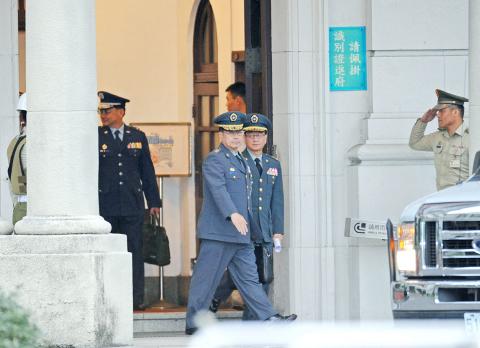President Ma Ying-jeou (馬英九) yesterday punished Chief of the General Staff Yen Teh-fa (嚴德發) with one demerit and Army Commander General Chiu Kuo-cheng (邱國正) with two demerits following an outcry over visits on March 29 by unauthorized civilians to a restricted-access base housing US-made AH-64E Apache helicopters.
According to a press release issued by the Presidential Office last night, Ma said the visit to the 601st Air Cavalry Brigade base in Taoyuan’s Longtan District (龍潭) falls under the purview of Yen and Chiu and that their “lack of supervision” demonstrated a lack of military discipline that compromised military security.
Led by Minister of National Defense Kao Kuang-chi (高廣圻), Yen, Chiu and other military officials presented a report to Ma on a recent spate of military scandals after the military conducted a review involving all units on Tuesday.

Photo: CNA
Kao offered to resign to take responsibility for the Apache incident, but Ma asked him to stay to strengthen discipline and maintain morale in the military, Presidential Office spokesperson Charles Chen (陳以信) said.
Deputy ministers of defense Liu Chen-wu (劉震武) and Chen Yung-kang (陳永康), Navy Commander Admiral Li Hsi-ming (李喜明), Air Force Commander General Shen Yi-ming (沈一鳴), Reserve Forces Command Headquarters Chief of Staff Lieutenant General Bi Hsueh-wen (畢學文) and Military Police Commander Lieutenant General Wu Ying-ping (吳應平) were also present at the meeting at the Presidential Office Building.
Earlier in the day, the ministry announced more punishments, focusing on Lieutenant General Chen Chien-tsai (陳健財), who was removed from his post as commander of the Army Special Forces Command’s Airborne Headquarters.
Taking blame for the fallout and security lapses arising from the unauthorized civilian visits, Chen Chien-tsai has been demoted and transferred to a non-supervisory post as a consultative member at the Army Command Headquarters (ACH) office.
“Chen Chien-tsai did not fulfill his responsibility as the commander in charge of the unit, and did not conduct the suitable followup work on the incident,” ministry spokesman Major General David Lo (羅紹和) said.
“Major General Chien Tsung-yuan (簡聰淵), commander of the 601st Air Cavalry Brigade, was also removed from his post, and transferred to ACH as a consultative member. If the two officers do not take up other military posts within a year, by military regulations, they will be forced to retire,” Lo added.
The Army Special Forces Command Airborne Headquarters, which was headed by Chen Chien-tsai, has direct jurisdiction over the 601st and 602nd Air Cavalry Brigade, among other specially trained elite units, including paratroopers, amphibious fighting battalions, reconnaissance helicopter and attack helicopter operation units.
The 601st and 602nd brigades, based in Taoyuan’s Longtan District and Taichung’s Sinshe (新社) respectively, are the two units responsible for the service and operation of the helicopters, the last of which were delivered in October last year.
A total of 61 Bell AH-1W Super Cobra attack helicopters, obtained from the US in arms procurement packages during the 1990s, are also deployed at these two brigades.

US President Donald Trump yesterday announced sweeping "reciprocal tariffs" on US trading partners, including a 32 percent tax on goods from Taiwan that is set to take effect on Wednesday. At a Rose Garden event, Trump declared a 10 percent baseline tax on imports from all countries, with the White House saying it would take effect on Saturday. Countries with larger trade surpluses with the US would face higher duties beginning on Wednesday, including Taiwan (32 percent), China (34 percent), Japan (24 percent), South Korea (25 percent), Vietnam (46 percent) and Thailand (36 percent). Canada and Mexico, the two largest US trading

AIR SUPPORT: The Ministry of National Defense thanked the US for the delivery, adding that it was an indicator of the White House’s commitment to the Taiwan Relations Act Deputy Minister of National Defense Po Horng-huei (柏鴻輝) and Representative to the US Alexander Yui on Friday attended a delivery ceremony for the first of Taiwan’s long-awaited 66 F-16C/D Block 70 jets at a Lockheed Martin Corp factory in Greenville, South Carolina. “We are so proud to be the global home of the F-16 and to support Taiwan’s air defense capabilities,” US Representative William Timmons wrote on X, alongside a photograph of Taiwanese and US officials at the event. The F-16C/D Block 70 jets Taiwan ordered have the same capabilities as aircraft that had been upgraded to F-16Vs. The batch of Lockheed Martin

China's military today said it began joint army, navy and rocket force exercises around Taiwan to "serve as a stern warning and powerful deterrent against Taiwanese independence," calling President William Lai (賴清德) a "parasite." The exercises come after Lai called Beijing a "foreign hostile force" last month. More than 10 Chinese military ships approached close to Taiwan's 24 nautical mile (44.4km) contiguous zone this morning and Taiwan sent its own warships to respond, two senior Taiwanese officials said. Taiwan has not yet detected any live fire by the Chinese military so far, one of the officials said. The drills took place after US Secretary

THUGGISH BEHAVIOR: Encouraging people to report independence supporters is another intimidation tactic that threatens cross-strait peace, the state department said China setting up an online system for reporting “Taiwanese independence” advocates is an “irresponsible and reprehensible” act, a US government spokesperson said on Friday. “China’s call for private individuals to report on alleged ‘persecution or suppression’ by supposed ‘Taiwan independence henchmen and accomplices’ is irresponsible and reprehensible,” an unnamed US Department of State spokesperson told the Central News Agency in an e-mail. The move is part of Beijing’s “intimidation campaign” against Taiwan and its supporters, and is “threatening free speech around the world, destabilizing the Indo-Pacific region, and deliberately eroding the cross-strait status quo,” the spokesperson said. The Chinese Communist Party’s “threats